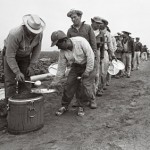As we’re all aware, the momentum of the presidential campaign has shifted significantly towards Obama in recent weeks. As of today, for example, Obama leads McCain in the national polls by as much as fourteen percentage points (53% to 39%), compared with gaps of four or five points as recently as a week earlier.
This is, of course, exactly what political scientists have been predicting, based on such large, external factors as the economic situation and the party currently in power.
The big questions now are whether Obama’s current lead in the polls will hold up over the next three weeks, and whether or not this lead is likely to translate into victory on Election Day.
This post won’t address the first question, which boils down to whether, and how, voter sentiment might change dramatically between now and November 4. Instead, I want to address the second question: how has Obama’s recent surge in the polls affected the map of the Electoral College?
Click here to read the rest of this entry

